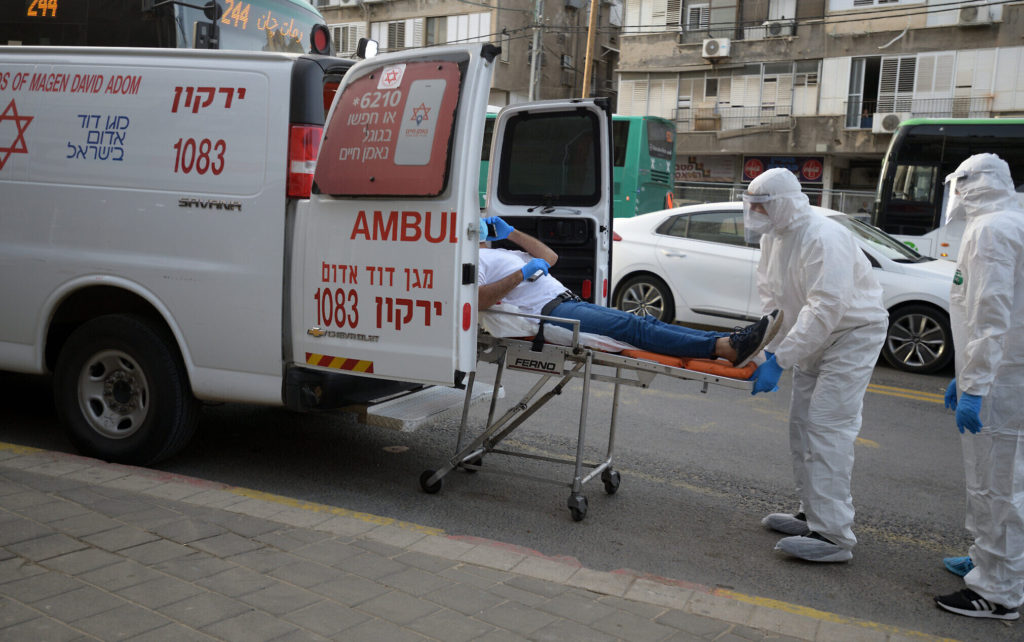FRESH AIR
Israel roils under COVID-19 second wave
October 7, 2020 | Ahron Shapiro

The state of Israel continues to grapple with a surging second wave of coronavirus infections that has set the country on edge, as different segments of Israeli society blame one another for the upsurge and argue about how best to deal with it.
Israel’s first wave of the virus peaked on April 2 with 764 new cases but receded after a rigid lockdown over the Passover holiday shortly thereafter. After the rules were relaxed, cases crept higher, with 868 new cases registered on July 1 and then plateauing at around 2,000 per day for most of the northern summer. By the end of August, however, cases began to soar, reaching new highs on a weekly basis.
On October 1 alone, Israel registered over 9,000 new cases, making it one of the world’s worst coronavirus hotspots per capita. However, following recent national lockdowns, as of October 5, there were early signs that the curve was beginning to flatten.
Members of Israel’s ultra-Orthodox (or, haredi) Jewish community accounted for approximately 40% of new COVID-19 cases as of October 1 – a high number given that community’s proportion of Israel’s overall population – of which they comprise some 12%.
Certain ultra-Orthodox sects have been violently resisting lockdown during the high holiday season, which began with Rosh Hashanah – the Jewish new year – on the eve of September 19 (when the second lockdown began) and continues through to the holiday of Simchat Torah on October 11.
Mass gatherings in the Arab communities also fueled the case spike during the second wave, as Ha’aretz analyst Amos Harel observed recently: “During the first wave, thanks to a concerted effort by residents and local authorities, the infection rate in the Arab communities was lower than the national average. This changed during the second wave, particularly since Eid al-Adha, a major Muslim holiday, at the end of July. Mass gatherings that violated Health Ministry guidelines and large family events where social distancing was not observed contributed to a steady spike in the rate of illness among the Arab population.”
On October 4, Israeli Arab leader and Joint List party head Ayman Odeh announced he had tested positive for coronavirus.
Israel’s major hospitals have activated wartime contingency plans and opened coronavirus wards in underground car parks specially designed to be converted into wards in times of emergency. This was done partly out of overcrowding and partly in order to ensure coronavirus patients are isolated from other patients.
Meanwhile, a September 30 Knesset decision to limit the distance people can travel to attend protests as part of the nationwide lockdown – which affects the demonstrations that have been taking place regularly in Jerusalem near the Prime Minister’s residence – has been met with continued protests, now spread across the country.

Graphic: Yediot Ahronot cover October 5, 2020
On October 5, the Hebrew daily Yediot Ahronot’s lead story on page one was a commentary by respected columnist Nahum Barnea, who suggested that the level of protest has put Israel on a path that could evolve into “civil rebellion” against Israeli Prime Minister Binyamin Netanyahu and the national emergency unity government that he leads. Moreover, Barnea argued the protests, unrest and loss of trust in government now transcend all political lines. The passage, the opening to a larger piece inside the paper, read in the original Hebrew as follows (translation by AIJAC):
It was Netanyahu’s great, unforgivable sin that he tried to manage the corona crisis with political tools. The politicization of the corona knew no bounds. The result is a crisis of confidence from the worst kind we’ve ever known. An abyss opened up between the government and the citizens.
What kept the Israelis at home [in the first lockdown] was a combination of tangible anxiety, individually, and trust in the system.
But the problem is that in the aftermath, it turns out that the success wasn’t that great and reopening from the first wave invited catastrophe.
The public doesn’t trust the guidelines. The public doesn’t trust the motives of the people making the decisions about the guidelines. This distrust goes beyond the defined area of any particular political camp.
It is alive and kicking in the courts of the rabbis in Bnei Brak as much as it is alive and kicking in the demonstrations at Tel Aviv.
What the ministers are struggling to understand is that they will not succeed by applying more force.
Without any trust, there will not be any enforcement, not in this pandemic. All the attempts by the police to quash the protests by force end up just widening the circle of protesters and escalating their resistance. The protest might spiral into rebellion. It may be that for the first time since Israel was created, civil rebellion may be experienced here on a large scale.
Barnea, it should be said, is not a neutral observer and openly backed Blue and White party leader Benny Gantz over Netanyahu in the recent elections. Moreover, his idea that the protests by the ultra-Orthodox, which are squarely aimed at the lockdown and its effects on religious services and gatherings, necessarily have common ground with ongoing, largely political, anti-Netanyahu protests is arguable, to say the least. But his points about loss of trust and confidence in government motives behind coronavirus restrictions is borne out in polls – such as one published by Tel Aviv University’s Institute for National Security Studies on September 29 – and the decision to run Barnea’s viewpoint as the lead story in one of Israel’s largest newspapers is significant.
According to a September 23 poll by the Israel Democracy Institute, when asked whether they “trust Prime Minister Netanyahu in leading the effort against the Corona crisis”, only 27% of respondents said they did. Meanwhile, Tourism Minister Asaf Zamir of Alternate Prime Minister Benny Gantz’ Blue and White party refused to remain in the government and resigned on October 2, while Blue and White supporters are reportedly pressuring the party to call for new elections.
Nevertheless, Ha’aretz analyst Anshel Pfeffer noted that both Netanyahu’s Likud and Blue and White are polling so poorly lately that it is assumed that ultimately neither side can risk bringing down the government and precipitating elections at the height of the current crisis.
Much of the Likud’s polling decline has shifted into a gain for Netanyahu’s rightist rival, Yamina party leader Naftali Bennett, who has been promoting his own detailed proposal for flattening the curve of Israel’s second wave of coronavirus without sacrificing the economy.
Elsewhere, Israel’s coronavirus commissioner Prof. Ronni Gamzu, who only committed to serve temporarily when he accepted the role in late July, is widely expected to leave the post at the end of October. Netanyahu has reportedly offered the position to previous coronavirus health coordinator, Moshe Bar Siman-Tov, who was director-general of the Health Ministry during the well-managed first wave earlier in the year. However, Siman-Tov is reportedly reluctant to return.
In more encouraging news, the US-based, Israeli-founded company Visby Medical has received US FDA approval to manufacture its innovative reusable, personal COVID-19 test kit. The hand-held unit, which tests based on the same polymerase chain reaction (PCR) method used by laboratories worldwide, can provide reliable results within 30 minutes and has the potential of revolutionising testing and eliminating false-negatives as a result of testing too soon after exposure.
Israel’s Defence Minister and Alternate Prime Minister Gantz has promised to fast-track the device for use in Israel in its fight against the novel coronavirus and Israel is reportedly seeking a deal to open a production line to produce the kits locally.
Tags: COVID-19, Israel, coronavirus
RELATED ARTICLES

US Middle East strategy amid regional instability: Dana Stroul at the Sydney Institute

Antisemitism in Australia after the Bondi Massacre: Arsen Ostrovsky at the Sydney Institute





















